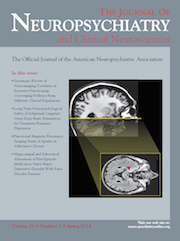Worsening of Psychosis With Aripiprazole
To the Editor: Aripiprazole, a dopamine–serotonin system stabilizer is a partial agonist at D2 and 5HT−1A receptors and a partial antagonist at 5HT2A receptors. It increases dopamine levels in a hypodopaminergic state and decreases dopamine levels in a hyperdopaminergic state.1 We describe a patient with acute worsening of psychotic symptoms after initiation of aripiprazole.
Case Report
A 33-year-old woman was admitted because of significant disorganized behavior. There was a history of heavy alcohol use in the preceding few weeks with cognitive and vegetative depressive symptoms. On examination she was disheveled and poorly groomed, perplexed, and fearful. She expressed mood congruent delusions of guilt and persecution associated with second person command auditory hallucinations.
An initial diagnosis of alcohol withdrawal with associated psychotic symptoms, with a differential diagnosis of depressive episode with melancholic symptoms was made. She did not have any withdrawal symptoms on AWS after 48 hours. She was started on mirtazapine 15 mg for the depressive symptoms, increasing the dose to 30 mg after a few days. There was significant improvement in her mood, and the acute perceptual disturbances settled without the addition of antipsychotic medications. The collateral information from the family revealed low grade suspiciousness and mistrust of family members for a few years. There was a strong family history of schizophrenia in her brother and bipolar affective disorder in her maternal grandmother.
She continued to have persecutory and referential ideas to which she had insight and she did not act on these beliefs. Because of the family history of schizophrenia and ongoing referential themes in her thought, it was decided to start her on an antipsychotic medication. Aripiprazole was chosen because of its favorable side effect profile in regard to weight gain. She was commenced on 10 mg daily for 5 days after which the dose was increased to 15 mg per day.
There was a gradual deterioration of her mental status over the week following the introduction of aripiprazole with re-emergence of persecutory and referential delusions and auditory hallucinations. The dose of aripiprazole was increased considering the worsening of symptoms. There was no ongoing drug use in the ward. There was a dramatic deterioration over the next several days with the patient responding to auditory hallucinations and intense persecutory delusions. Aripiprazole was stopped, and she was started on olanzapine (10 mg two times per day). She rapidly improved and over the following 10 days there was complete resolution of her psychotic symptoms.
There are case reports of aripiprazole worsening psychosis in patients.2–4 There have been reports of worsening of psychosis when aripiprazole was added to patients who were being prescribed haloperidol. A background hypodopaminergic state induced by haloperidol may have potentiated the dopamine agonist activity of aripiprazole.4 Interestingly, alcohol withdrawal and early abstinence are known to cause a hypodopaminergic state and this may have contributed to the acute worsening of psychotic symptoms in this patient when aripiprazole was added.5 The potential of aripiprazole to worsen psychosis needs to be considered when acute deterioration in mental state is noted after its addition.
1 : Aripiprazole, a “Dopamine-serotonin System Stabiliser” in the treatment of psychosis. Ger J Psychiatry 2003; 6:9–16Google Scholar
2 : Aripiprazole and worsening of psychosis: a case report. J Clin Psychiatry 2007; 68:805–806Crossref, Medline, Google Scholar
3 : Aripiprazole worsens psychosis: a case report. Prim Care Companion J Clin Psychiatry 2006; 8:380–381Crossref, Medline, Google Scholar
4 : New-onset psychosis and emergence of suicidal ideation with aripiprazole. Am J Psychiatry 2010; 167:1535–1536Crossref, Medline, Google Scholar
5 : Neuropharmacology of addiction and how it informs treatment. Br Med Bull 2010; 96:93–110Crossref, Medline, Google Scholar



